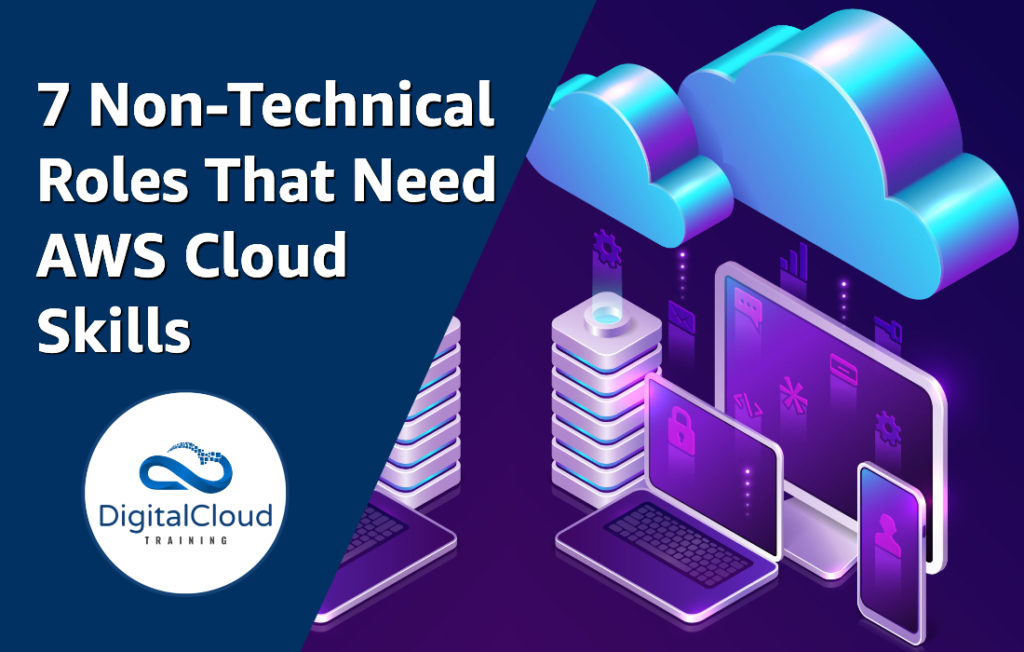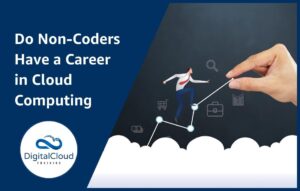7 Non-Technical Roles That Need AWS Cloud Skills
Please use the menu below to navigate the article sections:

As companies prioritize digital transformation, fluency in cloud computing basics is becoming an important skill for even those in roles not traditionally considered technical. Cloud computing is an industry poised for continued growth as businesses of all sizes move their technical operations off-premise to flexible cloud offerings. Gartner projects that the cloud computing industry will see 3 times the growth of overall IT services through 2022.
As demand for cloud computing grows, so does AWS’s leadership in the industry. In 2015, AWS reported revenue of $1.57 billion. This number ballooned to revenue of $25 billion in 2018. In Gartner’s 2019 Magic Quadrant for Cloud Infrastructure as a Service report, AWS was the leader over competitors including Microsoft, Google, and IBM – with a 47.8% market share. AWS is a cloud computing vendor professionals are likely to encounter at some point in their careers, making the Certified Cloud Practitioner exam a meaningful career investment.
The AWS cloud practitioner credential imparts foundational knowledge of cloud computing to beginners and non-technical roles who want to know how to “speak cloud.” If you’re in a tech-adjacent professional, you will find this certification especially relevant.
What is cloud computing?
Cloud computing delivers IT resources like compute power, storage, databases, virtual machines and more through a web-based platform. Public cloud platforms like AWS own and maintain the costly hardware, such as servers and data centers, required for these IT services. What makes it a game-changer for companies is the ability to easily scale technical operations on-demand and to pay for only the services used for as long as they’re used. No investment in on-premise hardware is required.
Traditional on-premise IT services have high operational costs and require continued upkeep by many on-site employees. Cloud service providers can offer lower costs thanks to economies of scale. Because multiple customers share the same underlying resources, like a networking system, that trickles down to considerably lower costs as compared to legacy IT offerings.
7 non-technical roles that need AWS skills
Since the AWS Certified Cloud Practitioner exam requires a holistic view of the AWS ecosystem and its business offerings, I recommend this certification for just about anyone working in a company or industry that is using AWS or considering moving to public cloud providers. That’s likely you!
This certification will help non-technical professionals “speak cloud” and ensure they’re communicating effectively with customers and cross-functional colleagues. Completing the exam is also an important first step for anyone wanting to pursue more technical AWS Associate-level certifications. So, exactly who should take the AWS Certified Cloud Practitioner exam? Roles adjacent to technical roles that would benefit from basic AWS Cloud skills include:
- Project managers: Since project managers work collaboratively with stakeholders of many functions, both technical and non-technical, proficiency in AWS basics will make those collaborations much smoother.
- Sales teams: When selling to a prospect or negotiating a renewal with a customer, sales representatives must talk the talk when it comes to technology. Whether working directly with AWS or in a tertiary technology, speaking confidently about cloud computing may help close the deal.
- Marketing teams: Similar to sales teams, those building marketing materials and campaigns related to AWS in any way can’t expect to capture their audience’s attention if they’re not speaking the same cloud language.
- Executives: In the age of digital transformation, leadership teams from directors to the C-suite should understand the wide-ranging implications cloud computing technology has on business — from budgets to competitive advantage to employee productivity.
- Legal teams: The global reach of AWS and its regional services is a big benefit for companies, but it brings with it security and compliance issues. Legal teams will find this certification beneficial for ensuring their company adheres to geo-specific compliance and security standards.
- Finance teams: Because public cloud services are a variable expense dynamic to a company’s growth, finance professionals will have a better grasp of budget allowances by learning more about the pricing variables implicit in the AWS platform.
- Beginner-level IT and tech professionals: With AWS the market leader in cloud computing, it’s likely that professionals new to IT will use Amazon’s platform at some point throughout their careers. Make your resume more attractive to recruiters or set yourself up for a promotion by demonstrating mastery of this in-demand skill.
Key AWS skills non-technical roles should master
I designed the AWS Certified Cloud Practitioner Exam Training with the non-technical professionals listed above in mind. The course equips students to pass the exam with a high-level understanding of AWS. The AWS platform offers over 160 services, so we focus on the following priorities that have the most relevance to the non-technical AWS user:
Global infrastructure: AWS has extensive resources around the world. Its infrastructure is divided into 22 regions, which are then supported by many smaller data center availability zones and edge locations. Amazon created this layered architecture to ensure customers have high availability and reliable performance. For instance, if the server powering a company’s website goes down in Availability Zone A, the nearby Availability Zone B can take over website deployment since it was designed as an independent failure zone.
The logistics of the AWS physical infrastructure are important for organization-wide stakeholders to understand. Any downtime can have significant ramifications across business units, especially when it comes to customer satisfaction.
Security in the cloud: Ensuring the security of customer data is a necessary piece of any company’s digital transformation strategy. This is why it’s imperative for even non-technical staff to understand the best practices of data and infrastructure security in the cloud.
While the exam covers a high-level review of key AWS security services, it’s particularly important for the non-technical employee to learn the AWS Shared Responsibility Model. This outlines the cloud security components Amazon is responsible for (e.g. properly building secure components) versus what the customer is responsible for (e.g. properly configuring networks and data encryption).
Pricing model: The 160+ services of AWS can be finely calibrated to make the most of a company’s budget and technical needs, but that requires a high-level understanding of the AWS pricing structure. Of course, financial roles may be the most interested in how AWS structures its pricing, but it’s also an important topic for project managers, executives and technical team leads.
Non-technical roles will want to understand how AWS constructs its pricing based on the use of compute, storage and outbound data transfer services. The costs of these services are then broken down into “instances” based on how often they’re used. Examples of these instances include:
- On-demand instances with no contract required and charges accrued based only on the seconds used of the service.
- Scheduled instances can be purchased on a recurring schedule such as daily, weekly, or monthly for a one-year timeframe.
- Spot instances let users save up to 90% in typical compute costs by requesting the use of unused compute instances within the AWS cloud system.
- Dedicated instances run a virtual private cloud on hardware dedicated to a single customer. This is an expensive option that most companies will shy away from.
My AWS Certified Cloud Practitioner course will successfully prepare you to pass the exam. We also offer practice exams that are timed and scored to mimic the real exam environment. Taking a technical exam doesn’t have to be intimidating even if you don’t have a technical background. Proficiency in cloud services and how AWS cloud can enhance an organization’s productivity will set companies and individuals apart in the next decade.
This article was originally posted on Udemy’s Blog




